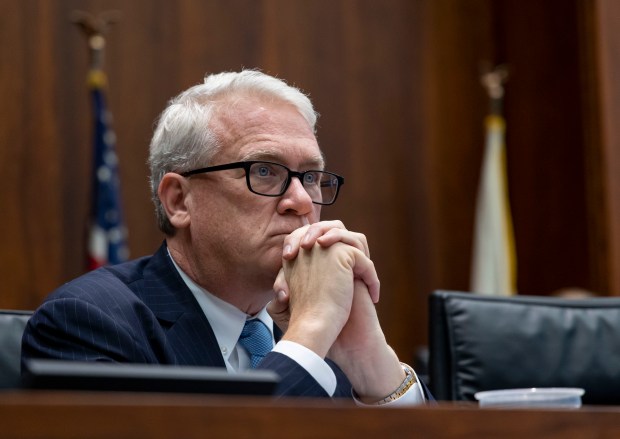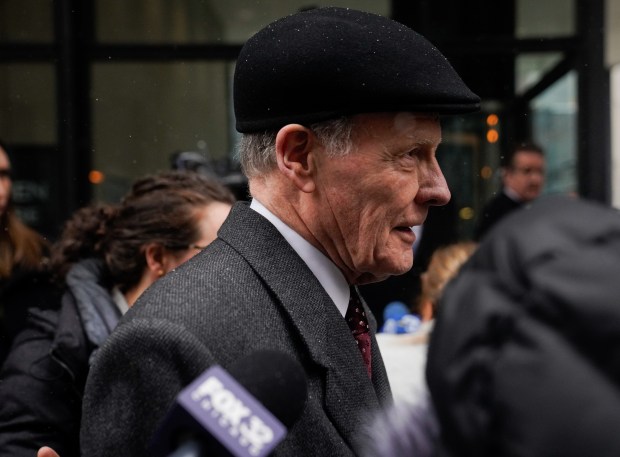Michael Madigan’s vaunted political skills were often likened to a grandmaster of the 3-D chess board featured on the original “Star Trek” TV series in which he always appeared to be at least two moves ahead of his opponent.
That was until a federal court jury flipped the chessboard over on Wednesday when it convicted the former Democratic Illinois House speaker who served as the state’s most powerful politician for decades.
Now, Republicans, the minority party who portrayed Madigan as corrupt for years with muted success, have Madigan the convicted felon to feature in next year’s state races, giving them an opening toward regaining some relevance in Springfield.
But their path is littered with obstacles, including the nationalizing of local elections that makes President Donald Trump, himself a convicted felon, a campaign issue for Republicans. There’s also the partisan gerrymandered legislative district maps drawn by and designed to favor Democrats and demographic changes in the critical and once heavily Republican suburbs.
When former GOP state Chairman Pat Brady launched his “Fire Madigan” campaign shortly after taking the party post in 2009, the powerful speaker — who was also a longtime head of the Illinois Democratic Party — was largely an unknown political force to many Illinoisans. In the fall of 2012, a Tribune poll showed 4-in-10 voters had no opinion of him. But by 2019, a Paul Simon Institute poll showed 71% disapproved of Madigan’s job as speaker.
Helping to drive up Madigan’s negatives was more than $21 million that then-Gov. Bruce Rauner, a Republican, spent in 2016 on campaigns for GOP legislative candidates that vilified the then-House speaker. The House GOP picked up only four seats that year.
Asked if he felt vindicated by the Madigan conviction, Rauner deflected and said in a statement that “unfortunately, corruption is not a partisan problem.” He did, however, recall that Madigan “fought us tooth and nail” against Rauner’s effort to impose legislative term limits, which he called “one of the few concrete helpful steps to take” to combat corruption.
“The corruption and mismanagement of Illinois are heartbreaking to me. I was born and raised there, lived there 55 years, raised our family, built our business. So many wonderful people there. I tried to do everything I could to make a better future for them,” said Rauner, who moved to Florida after one tempestuous term battling Madigan and the Democrat’s union allies when he was defeated by Democrat JB Pritzker in 2018.
One of the beneficiaries of Rauner’s campaign money was Tony McCombie of Savanna, the current House Republican leader who first won a House seat in 2016 in a blowout victory over the Democratic incumbent.
“Absolutely there (were) certainly a lot of Madigan discussions at that time for my race,” she said. “Madigan has certainly been the most powerful speaker, the longest-serving speaker in history and somebody who thought he was invincible. And I think a lot of people in Illinois politics, regardless if you’re an R or a D, nobody thought he could be taken down. And now, thankfully, we see that that can be done.”
McCombie said Democrats should take the Madigan conviction seriously and propose and pass significant ethical reforms.
“It will be up to them if they decide to change their ways,” she said. “If they don’t, of course, we will use that (conviction) in campaigns, absolutely. And now, we have proof once again, by the courts, that we were right on this issue.”
McCombie acknowledged the Democrat-drawn redistricting map, where Democrats currently hold a 78-40 House supermajority advantage over Republicans, is a significant hurdle for GOP candidates. She is leading a lawsuit to challenge the map lines, though it is questionable whether the Democratic-led Illinois Supreme Court will accept the case or render a judgment.
And she dismissed concerns about any effect Trump may have on the races. The president last year became the first former president to be convicted of felony crimes after a New York jury found him guilty of falsifying business records in a scheme to illegally influence the 2016 election through hush money payments to a porn actor who said the two had sex.
Trump was elected despite the conviction and McCombie said the president’s second administration “is off to a pretty good start, certainly going with the things he said he was going to do.” But she added that much will depend on how the president is viewed by voters at the midterm elections next year when the out-of-power party traditionally sees gains.
Jim Durkin, McCombie’s predecessor as House GOP leader, stepped down from the legislature after the 2022 election. He blamed continued GOP losses on Illinois Republicans who aligned with Trump and, for instance, adopted downstate, far-right candidate Darren Bailey as its nominee to challenge Pritzker, who easily defeated Bailey.
“You’re fighting uphill,” Durkin said of Republicans’ chances next year. “But this is an opportunity to penetrate in areas, and you’ve got to be selective in the areas that you’re making the case,” a reference to suburban areas that have become more socially moderate while showing disdain for Trump. “Hitching yourself to the Trump wagon in some areas of the state may not be wise.”
Durkin also questioned whether Madigan’s conviction would change any minds among Democratic voters who have stuck with their party despite a history of corruption convictions involving elected officials from their party. He said there seems “almost a double standard that applies to the public versus Democrats and Republicans” convicted of corruption.
“I know that our (GOP) leaders are out there making the case, but there has to be this groundswell that comes from this verdict that is going to change the nature of the dynamics of Springfield, because it’s very difficult to penetrate. And we have, over the years, tried to against Make Madigan and it really hasn’t moved the needle that much,” Durkin said.

“This is a reason for the (GOP) leaders in the House and Senate to go before civic groups and other entities in the state who have a definite interest in the betterment of this state to say that, ‘There’s other voices out there,’” he said. “This is an opportunity to talk about why you need more checks and balances in Springfield.”
But one veteran observer of Springfield said the changes of ideology within state Republicans as well as changing demographics with growing racial and ethnic populations will make GOP attempts to exploit Madigan’s conviction difficult in the all-important suburbs.
“If this were still the Republican Party of (moderate former Govs.) Jim Thompson and Jim Edgar, yeah, it would be very helpful,” Charles Wheeler, an emeritus professor of journalism at the University of Illinois Springfield, said of the conviction.
“But the Republican Party of MAGA adherents, they’re not going to be able to win in the suburbs because of the changing demographics,” he said, using the acronym of Trump’s slogan, “Make America Great Again.”
“I don’t think that plays well with folks in areas where Republicans would need to make gains,” Wheeler said. “And where they need to make progress is in the suburbs and I don’t think Madigan is going to help that much.”




